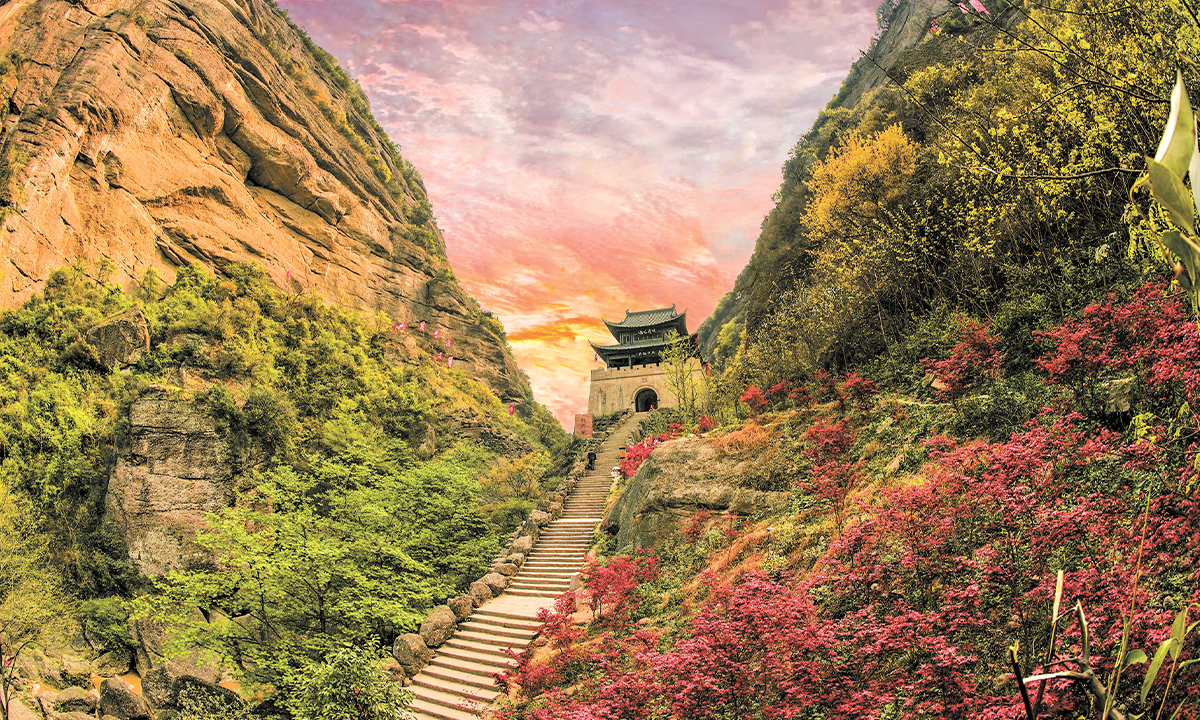
The Jianmenguan scenic spot in Guangyuan, Southwest China's Sichuan Province Photo: Courtesy of the publicity department of Jiange county, Sichuan Province
"The road system to Shu is difficult, even more difficult than climbing to the blue sky," echoes the lament of ancient Chinese poet Li Bai through the annals of time, immortalizing the ancient Shu Road system, or
shudao, an ancient road system to the Shu Kingdom separated from the Central Plains of China by numerous steep mountains.
Throughout history, the ancient Shu Road system in today's Southwest China's Sichuan Province, dating back over two millennia, has been a vital link between the Yangtze River and Yellow River civilizations, transitioning between China's northern and southern geographical ecosystems.
To American scholar Hope Justman, the Shu Road system is more than a path; it is a living history book and a UNESCO-worthy "World Heritage" site.
Justman's journey with the Shu Road system began in 2001 at the age of 60, when she officially set foot on its ancient flagstones. Since then, she has embarked on this "greatest road in China" 24 times over 24 years, accompanied by her family and friends, persistently contemplating and documenting her hiking experiences.
In March 2024, Justman led another tour along the road system to Shu in Jiange county, Sichuan Province. "Walking the old flagstones under the shade of the centuries-old cypress trees is a timeless experience that I have never found anywhere else," the 82-year-old woman told the Global Times via email.
In late October, the Chinese version of her book,
Guide to Hiking China's Old Road to Shu, was published, a compilation of the human history of the Shu Road system and the experiences of Western travelers who have journeyed along it over the centuries.
"I hope my book will encourage more people to visit China not just to travel the Road to Shu, but to experience Chinese culture firsthand," she said.
Inspiration of creationIn 2007, Justman published the
Guide to Hiking China's Old Road to Shu in the US, created a website dedicated to the Shu Road system, and made arrangements for American enthusiasts to hike in China.
In the book, she praises China's protection of the Shu Road system's ecological environment and ancient trees for over 2,000 years, while detailing her experiences inspecting traditional architecture and cultural sites along the road system, and appreciating local customs and folkways.
For Justman, the biggest challenge in writing her book was locating the ancient Shu Road system itself. With the help of the locals, she finally found a section of the road system.
"It was a memorably thrilling sight, and a promising sign that more sections of the road to Shu might have survived intact," she recalls. "I took a photograph of this first exhilarating glimpse of the road, which is now the cover of my book."
Justman believed that her book would introduce Western readers to the existence of many original flagstone sections of this ancient road system and aid them in finding and hiking them.
"I think Chinese readers, too, will find my book helpful as well because although they know the history of this famous road, most Chinese are unaware that many flagstone sections of the original road still exist and can be hiked for many hours."
The translator of the book, Qiu Tingting, told the Global Times that during the translation process, she sensed Justman's love for the ancient Shu Road system through her words.
"Her understanding of the ancient Shu Road system was gradual, and her interest and passion were entirely based on the charm of the ancient Shu Road system itself," said Qiu.
Stepping into historyWalking on the old flagstone slabs under the shade of 2000-year-old cypress trees has been an unforgettable experience for Justman.
"It becomes even more memorable when one realizes all the people over the centuries who have preceded you walking this same road," she says.
For Justman and her American friends, the Shu Road system is a window into a past that is both foreign and fascinating.
"The most fascinating historical period for me and for many others who have walked the Shu Road is the Three Kingdoms period (220-280)," she explained, noting that so many of the battles between Shu and Wei states were fought along this Road, and many of the towns have strong associations with the heroes of that era.
"If I were an ancient cypress along the old road, I would like to stand in the Cuiyunlang, just south of Jianmenguan," she said, adding that she would enjoy the company of the oldest trees that line the road.
Witness of ecological conservation
According to Justman, it is heartening to see the great efforts made to preserve the road system to Shu, especially the massive construction projects that have dramatically improved the setting of the old road system.
For example, damaged and missing flagstones have been repaired, and benches have been added in scenic spots, making the old road system more accessible and enjoyable for hikers.
Chen Yang, a local cultural expert who has accompanied Justman to visit the ancient road system since 2001, told the Global Times that it is thanks to the protection of the ecology and history that the Shu Road system culture can thrive.
He is deeply moved that foreign friends from the US travel thousands of miles to visit the Shu Road system every year and hopes that this ancient forest will continue to extend, allowing the Shu Road system culture to be passed down.
From the poems of the two most famous Tang Dynasty (618-907) poets, Li Bai and Du Fu, Justman got a deeper understanding of how dangerous it could be to travel the road system to Shu during a time of dynastic upheaval when the road system had fallen into disrepair.
"If both poets could come back today, I think they would be impressed by the progress and efficiency of the modern world, but I don't think they would be inspired by it to compose any new poems," she mused.
Many of Justman's American friends did not realize the massive modernization that has been taking place in China, especially over the last 20 years.
"I would like to see a world in which more people have the opportunity to travel to foreign countries and draw their own conclusions rather than sitting at home and basing their opinions on what they hear on television," she concluded.

Hope Justman Photo: Courtesy of Sichuan Ethnic Publishing House





